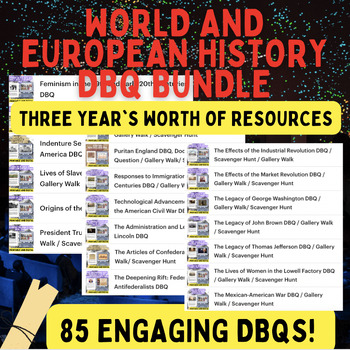World History & European History DBQs Bundle
- Zip

Products in this Bundle (85)
showing 1-5 of 85 products
Description
Hello! Thanks for visiting my store.
My DBQ (Document-Based Question) BUNDLE is just what you need! This bundle includes access to 85
(three year's worth of DBQ lessons). Each DBQ includes clear instructions for students, ample historical context, numerous primary sources, a detailed grading rubric, and a "Data Collection Sheet" to help students make connections, inferences, and take notes about the reliability of the documents. I’ve worked hard to create these resources and I know you'll love them, too.
What is a DBQ or Document Based Question?
A DBQ is an essay question that requires students to analyze a historical trend using historical documents. After looking at the essay prompt, students will need to use the primary and/or secondary documents provided to write a several-paragraph long essay.
To do well, they will need to be able to understand the meaning and historical context of the documents provided, identify intersection points between the documents, and apply their background knowledge about a historical trend to make a strong claim to answer the question. They will then need to support their claim using evidence and analysis from the historical documents. How fun and impactful!
DBQs will show up on history related AP exams, and students only have to answer one DBQ per exam.
Why I love using DBQs with my Students?
Using DBQs (Document Based Questions) with my students is a great way to foster critical thinking skills and allow them to assume the role of historians. By analyzing primary source documents and forming their own interpretations and arguments, students are able to engage with the material on a deeper level and develop their own understanding of historical events and concepts.
One of the main benefits of using DBQs is that they allow students to think critically about the documents and the context in which they were created. This helps students to better understand the perspectives and biases of the people who created the documents, and to consider how these factors might have influenced the content of the documents.
Another benefit of DBQs is that they have real-world applications. By learning how to analyze primary source documents and construct their own arguments, students are developing skills that are valuable not just in the classroom, but also in their everyday lives. This can help them to become more informed and engaged citizens, and to think more critically about the information they encounter in the world around them.
You can easily take the content from these resources and turn it into a Scavenger Hunt, Gallery Walk, or Argument Tower activity.


